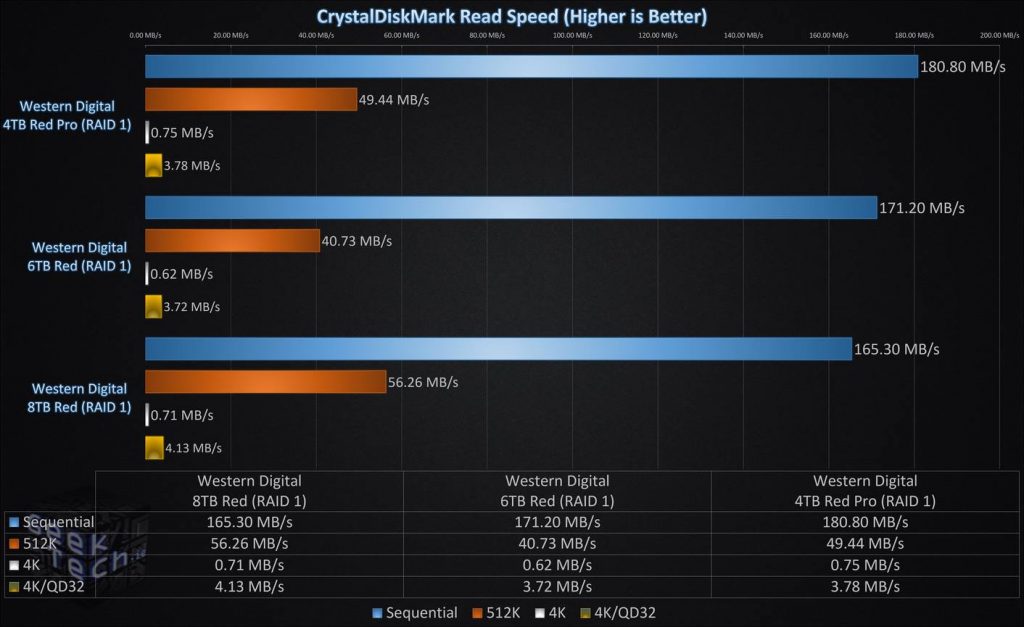The race for increased capacity continues, and while we have seen 8TB sizes and larger before: the first bunch of drives to launch with those sizes typically included some drawbacks with performance.
Western Digital’s Red series has always offered excellent performance, and we would expect nothing less from their new 8TB drives. So lets not waste anytime with the introduction and get this review rolling.
WD 8TB Red
Testing
Thankfully Western Digital were kind enough to send us two of their new 8TB Red drives, so we have a good few results we can take a look at and compare. First up we will take a look at single drive performance and then move onto RAID0/1 tests.
Test setup
Intel Core I7 4770k CPU
Gigabyte Z87X-OC Motherboard
Kingston HyperX Predator 2400Mhz
Corsair AX1200i PSU
Single Drive
So for a first test, we are taking a look at single drive performance. We have some of Western Digital other drives for comparison, including their 6TB Red and 4TB Red Pro.
Aida64
The read test suite cover a decent level of tests. Here we can see the limits of hard drive technology with most of the drivers sharing near identical numbers. It’s nice to see that the new 8TB drives doesn’t bring any drops in performance.
Read access is similar on all the drives expect the more expensive Red Pro drive. The 8TB drive is slower, but not enough to be significant.
Random write again shows the Red Pro series take the lead, but we have the 8TB Red come in a close second with a higher max result and a close average compared to the more expensive Red Pro.
Average write access has the new 8TB drives on top, but mostly identical to the Red Pro. The 6TB Red and Green drives see much larger average write access, which shows where the true benefits of the more expensive Red series.
CrystalDiskMark
Very similar results across the board. The 6TB Green is on top with the highest sequential speed, but not overshadowing the other drives. The 8TB series has solid results, but very typical of a hard drive nowadays.
Write speed shows the 512K write speed nearly doubled compared to read speeds. Impressive, but nothing to write home about.
HD Tune Pro
HD Tune Pro shows very consistent read speeds through all of the drives. The 8TB Red continues its lead with the write speed side of things, but again, being a hard drive, they suffer the same limitations we have seen for years.
RAID 0
Now it’s time for the double up tests. We got two of the 8TB Red drives and set them up in a RAID 0 and RAID 1 configs. First up we will take a look at the RAID 0 performance.
Aida64
Most results are showing near double the speed, which is of course as expected.
Access times haven’t really been affected because of the RAID0 configuration.

Buffered results show the Red Pro serious taking a clear advantage over the normal Red series. The new 8TB Red’s still show increased performance over the previous 6TB drives, but we can see the Red Pro coming into their own, but buffered tests aren’t always accurate.
The Write access speed shows the new 8TB drives taking a small lead against the Red Pro, but a much larger lead against the previous 6TB drives.
Lastly with Aida64 we have random write, which again shows the new 8TB drivers taking a nice lead against the previous generation.
CrystalDiskMark
CrystalDiskMark shows similar results on both read and write results. The 4TB Red Pro’s take the lead, but the gap is closed significantly with the write speed, and we can see the same pattern on the new 8TB continue.
HD Tune Pro
The 8TB Red’s had a fair low minimum, but their average was on point.
The opposite is true for the write speeds, with the maximum having a fairly large jump compared to the others, but the averages have dropped to the bottom of the list. It’s also the first time the 6TB Red’s have taken any lead over the Red Pro’s or beaten the new 8TB red’s significantly.
RAID 1
For our last set of charts, we’re taking a look at RAID1 testing. This combines both drives for complete parity and aids in the loss of data by using both drives to write the same information on. If one drive fails, then you have an exact copy of the data on the other. Performance with RAID1 is almost always very close to a single drive, but none the less the numbers can vary on some tests. Anyone looking to do RAID1 for data protection is unlikely to mind a slight drop in performance.
Aida64

The read speeds are on par with a single drive tests we showed above. The buffered read speeds are affected differently, but that has been the same throughout all of our tests.
Access times are unaffected by the RAID setup.

The buffered write speeds are fairly consistent and show the 8TB Red’s performing very similar to the Red Pro.
Results are again not really affected by the change to RAID 1. Thankfully that means performance won’t take a hit.

Like above, write access is unaffected by the RAID 1 setup.
Crystal Disk Mark


No real difference in performance. The results are mostly within margin, as if we simply ran the same tests again on a single drive.
HD Tune Pro


Sadly HD Tune Pro takes a different direction and we see a significant drop in write speed when using RAID 1. The average speed drops about 50MB/s compared to a single drive, and most likely due to the minimum speed dropping to 2.7MB/s. The tests showed this was a common occurrence and sadly shows a performance hit specific with the HD Tune tests.
Conclusion
Now we reach wrap up time. We have have gone through many tests and have got a fair idea of how Western Digital’s drives are progressing.
We’re pleased to see the new larger drives offer the same performance, if not better than previous lower capacity drivers. Obviously the newer drivers will cost more, but getting an extra 2TB’s of space over the previous 6TB’s with no hit on performance. While SSD’s are getting cheaper and have obvious performance benefits over hard drives, their still not at the capacities of hard drives: at least not for some insane price tags.
The new 8TB Red drives from Western Digital offer some of the highest numbers you can expect from a hard drive. The price point is about 20-percent more than the previous 6TB Red drives, which is fairly reasonable considering it’s a 30-percent increase in capacity. Pricing is the important factor when it comes to hard drive storage, and the 8TB Red will set you back around €350.
We gladly recommend the new 8TB drive from Western Digital. It’s pretty much on top or close with regards to performance compared to the best out there. Pricing is the important factor, and while we would like to see a drop in price across all hard drives, sadly that won’t happen until SSD’s get bigger and cheaper. That being said, the pricing for the new 8TB series isn’t too bad since we get excellent performance.



























